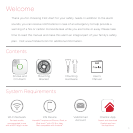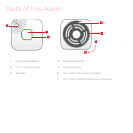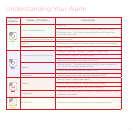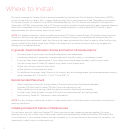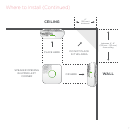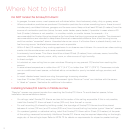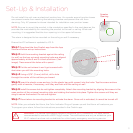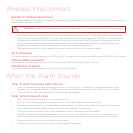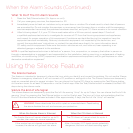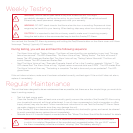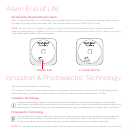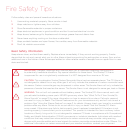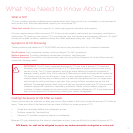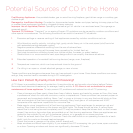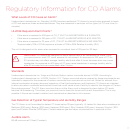
10
Wireless Interconnect
Benefits of Wireless Interconnect
The wireless interconnect feature on this alarm allows you to connect each of your First Alert Onelink alarms so when one
alarm sounds, they all will sound.
WARNING: Install alarms and test to assure range and reliability of interconnection throughout the house.
!
• First Alert Onelink alarms can typically communicate with each other if they’re 50ft (15m) apart inside a home.
Keep in mind that some features of a home may reduce the interconnect range and reliability of interconnection,
including the number of floors, number/size of rooms, furniture, type of building material, suspended ceilings,
ductwork, large metallic appliances and metal studs. This kind of interference may be fixed by adding more
Onelink alarms that can route wireless signals around any various obstructions.
• Make sure you test your Onelink alarms for proper interconnection via the weekly testing.
Wi-Fi Frequency
This alarm supports wireless frequency of 2.4Ghz b/g/n. For best results, recommended to use with a 802.11 b/g/n router.
Adding Additional Alarms
Simply follow the instructions on your Onelink app to add additional alarms to your account.
Identification of Events
If your alarm sounds, it is important to first identify the type of alarm.
When the Alarm Sounds
What To Do If The Smoke Alarm Sounds
• If the unit alarms and you are not testing the unit, it is warning you of a potentially dangerous situation that
requires your immediate attention. NEVER ignore any alarm. Ignoring the alarm may result in injury or death.
• If the unit alarms, then get everyone out of the house immediately.
What To Do In Case of a Fire
• Don’t panic; stay clam. Follow your family escape plan.
• Get out of the house as quickly as possible. Don’t stop to get dressed or collect anything.
• Feel doors with the back of your hand before opening them. If a door is cool, open it slowly. Don’t open a hot
door. Keep doors and windows closed, unless you must escape through them.
• Cover your nose and mouth with a cloth (preferably damp). Take short, shallow breaths.
• Meet at your planned meeting place outside your home, and do a head count to make sure everybody got
out safely. Call the Fire Department as soon as possible from outside. Give your address, then your name.
• Never go back inside a burning building for any reason.
• Contact your Fire Department for ideas on making your home safer.




